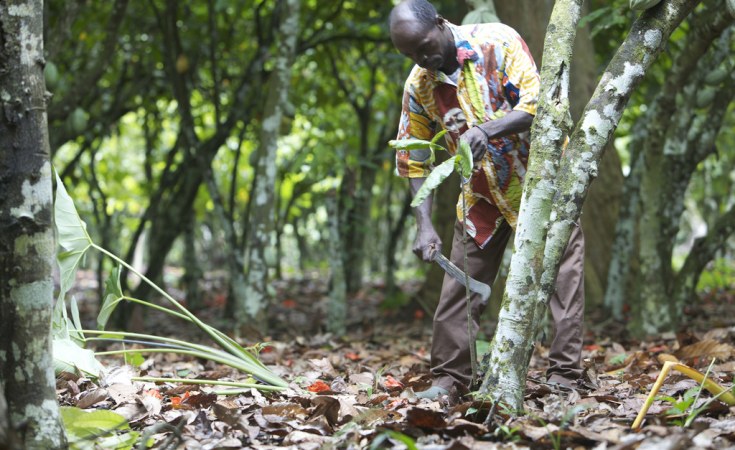The government is taking a multi-pronged approach to tackling the unhealthy practice of drying cocoa beans on roadsides.
2013 dawned rather sullenly for thousands of recalcitrant cocoa dealers across Cameroon unwilling to refrain from drying their beans on tarred roadsides. Cocoa quality and trade supervisory bodies in Cameroon, the world's fifth largest cocoa producer, have initiated a zero-tolerance clampdown against the unhealthy practice of drying cocoa beans on roadsides.
'Operation Punch' was launched in December along a 400 km stretch of road meandering from the capital Yaoundé to Tonga in the Centre Region. Officials carried out raids, seizing and torching cocoa beans being dried on the tarmac.
"Either we're producing top quality cocoa or we're not", Omer Gatien Maledy, Executive Secretary of Cameroon's Interprofessional Cocoa and Coffee Council (CICC), told Think Africa Press. "We can no longer take chances".
Maledy pointed out that in December a 3,000 ton consignment of cocoa was turned back by the European Union after it failed to meet quality standards.
Inspectors at European ports of entry claimed the beans exuded an unpleasant stench and contained high levels of polycyclic aromatic hydrocarbons (PAH) - which can be picked up from tar and asphalt, exhaust fumes and some pesticides - as well as pesticide residues.
"Recently, gossip has been spreading like bushfire worldwide that Cameroonian cocoa is dried on tarmacked roads and is thus unsafe", expounded Maledy, "the outcome is that our cocoa is now suspicious everywhere".
Cameroonian cocoa has indeed been selling at prices considerably below those of Ghanaian and Ivorian exports which are far better processed before shipping to the world market, although this is also related to recent bad weather.
Going through a dry patch
Cameroon produced 220,000 tonnes of cocoa in 2011/12, accounting for around 5.5% of the world's production. And thousands of Cameroonian farmers are involved in the cocoa industry which, together with coffee, accounts for 40% of Cameroon's exports in the primary sector.
Understandably therefore, the government is sensitive about any threats to the industry and keen to end the practice of drying cocoa beans on roads. They have vowed to crackdown on those engaging in the practice with added verve this year.
The National Cocoa and Coffee Board is also tackling middlemen who buy cocoa from farmers and sell it on to exporters. "They don't respect any quality requirements", said Angoula Jean, Coordinator of the Rehabilitation of Internal Marketing of Cocoa and Coffee at the Ministry of Trade.
"They disrespect beans' fermentation duration of at least five days to ensure that appropriate drying reduces moisture to at least 8% so the beans don't carry odours of pesticide residues. They dry cocoa beans on tarmac roads and mix good and bad quality beans", she explained.
However, some local dealers explained to Think Africa Press that there are no viable alternatives.
"Of course we know that it's unhealthy to dry cocoa beans besides tarred roads", complained Emmanuela Mofor, a local dealer in Kumba, the main trading centre in the South West Region. "But we lack space elsewhere to create ideal sun-drying conditions like cemented surfaces and elevated grids."
Ekani Michel, a cocoa producer in Ekoumdouma, just outside Yaoundé, commented: "The cheapest 18-metre long white canvass sheets we've been advised to buy for drying costs at least 500,000 FCFA (around $1,000) and is beyond the reach of many. Ovens are equally very expensive to build."
Keeping the quality
The government has responded to these problems by taking a multi-pronged approach to tackling roadside drying, as well as conducting research to try to gauge the exact amount of Cameroonian cocoa exports affected by the practice.
Alongside the raids, the CICC are organising workshops, seminars and farm fieldtrips to tutor farmers and other dealers in the cocoa chain on how to best uphold quality and comply with global standards.
Furthermore, at the start of this month, 44 repaired cocoa-drying ovens were handed over to cocoa producers in Bafia as part of the CICC's Oven Rehabilitation Project. And in January, over a thousand 18-square-metre canvas sheets were distributed to farmers in the country's Central and Western regions for free.
Cocoa is a crucial part of Cameroon's economy and, whether directly or indirectly, the industry affects the livelihoods and lives of much of the population. The practice of roadside drying is detrimental to quality standards, the prices of cocoa exports and the reputation of the country's output - ending it is thus a government priority.
As Maledy put it, "It's a trend that will continue if nothing is done. That's why we shall be merciless in our future outings, else we could end up with social unrest if hundreds of thousands of people relying on cocoa for a livelihood suddenly lose their income source."


